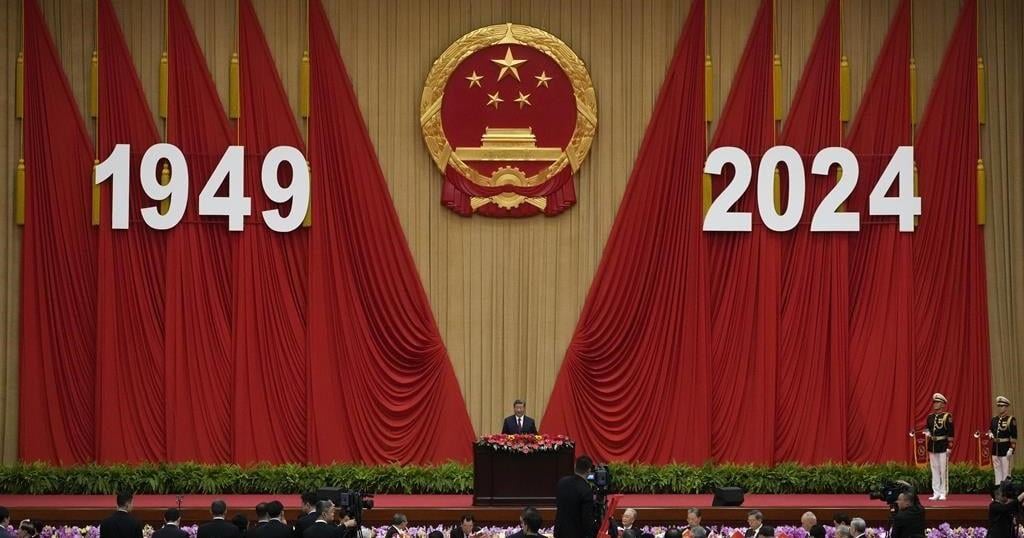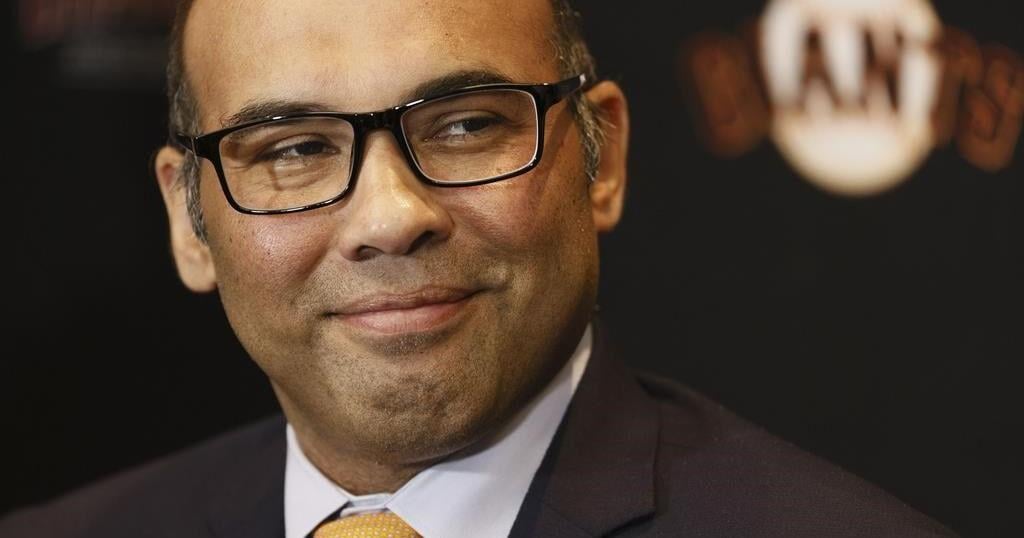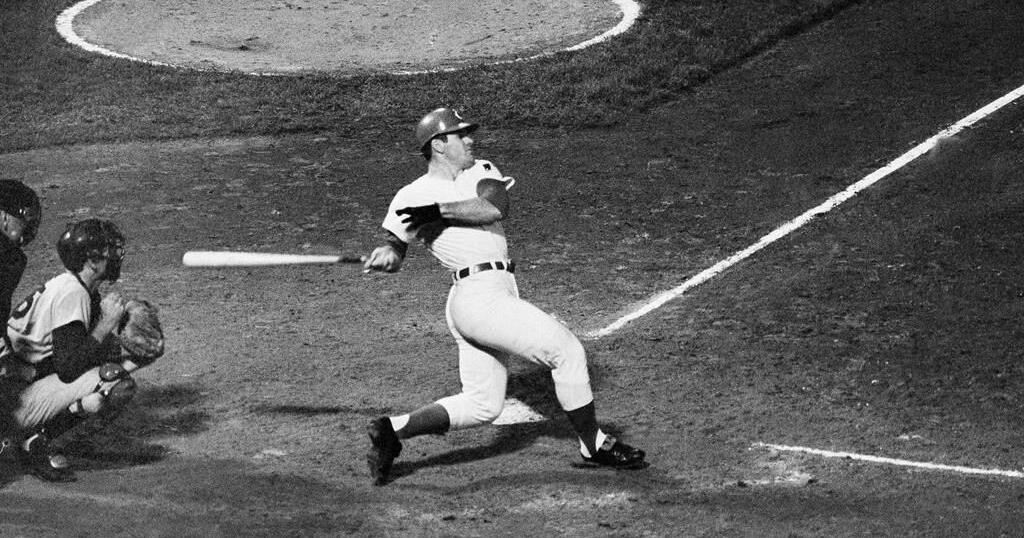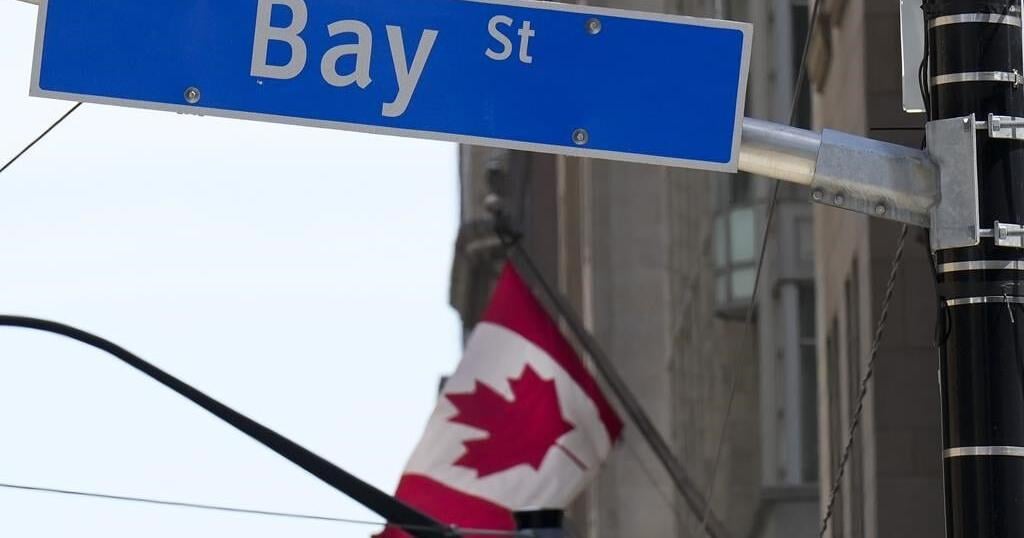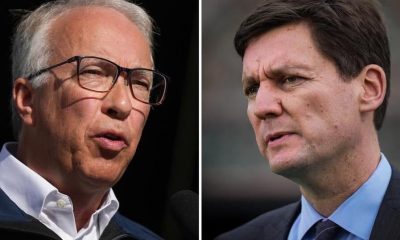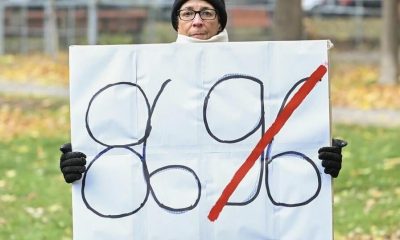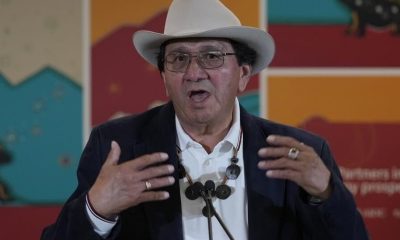NEW YORK (AP) — Pete Rose, baseball’s career hits leader and fallen idol who undermined his historic achievements and Hall of Fame dreams by gambling on the game he loved and once embodied, has died. He was 83.
Stephanie Wheatley, a spokesperson for Clark County in Nevada, confirmed on behalf of the medical examiner that Rose died Monday. Wheatley said his cause and manner of death had not yet been determined. Over the weekend, he had appeared at an autograph show in Nashville with former teammates Tony Perez, George Foster and Dave Concepcion.
For fans who came of age in the 1960s and ‘70s, no player was more exciting than the Cincinnati Reds’ No. 14, “Charlie Hustle,” the brash superstar with the shaggy hair, puggish nose and muscular forearms. At the dawn of artificial surfaces, divisional play and free agency, Rose was old school, a conscious, dirt-stained throwback to baseball’s early days. Millions could never forget him crouched and scowling at the plate, running full speed to first even after drawing a walk, or sprinting for the next base and diving headfirst into the bag.
Major League Baseball, which banished him in 1989, issued a brief statement expressing condolences and noting his “greatness, grit and determination on the field of play.” Reds principal owner and managing partner Bob Castellini said in a statement that Rose was “one of the fiercest competitors the game has ever seen” and added: “We must never forget what he accomplished.”
Longtime Reds teammate and Hall of Famer Johnny Bench posted his reaction to Rose’s death in a social media post, saying: “My heart is sad. I loved you Peter Edward. You made all of us better. No matter the life we led. No one can replace you.”
A 17-time All-Star, the switch-hitting Rose played on three World Series winners. He was the National League MVP in 1973 and World Series MVP two years later. He holds the major league record for games played (3,562) and plate appearances (15,890) and the NL record for the longest hitting streak (44). He was the leadoff man for one of baseball’s most formidable lineups with the Reds’ championship teams of 1975 and 1976, featuring Hall of Famers Perez, Bench and Joe Morgan.
But no milestone approached his 4,256 hits, breaking his hero Ty Cobb’s 4,191 and signifying his excellence no matter the notoriety which followed. It was a total so extraordinary that you could average 200 hits for 20 years and still come up short. Rose’s secret was consistency, and longevity. Over 24 seasons, all but six played entirely with the Reds, Rose had 200 hits or more 10 times, and more than 180 four other times. He batted .303 overall, even while switching from second base to outfield to third to first, and he led the league in hits seven times.
“Every summer, three things are going to happen,” Rose liked to say, “the grass is going to get green, the weather is going to get hot, and Pete Rose is going to get 200 hits and bat .300.”
Rose was Rookie of the Year in 1963, but he started off 0 for 12 with three walks and a hit by pitch before getting his first major league hit, an eighth-inning triple off Pittsburgh’s Bob Friend. It came in Cincinnati on April 13, 1963, the day before Rose’s 22nd birthday. He reached 1,000 in 1968, 2,000 just five years later and 3,000 just five years after that.
He moved into second place, ahead of Hank Aaron, with hit No. 3,772, in 1982. No. 4,000 was off the Phillies’ Jerry Koosman in 1984, exactly 21 years to the day after his first hit. He caught up with Cobb on Sept. 8, 1985, and surpassed him three days later, in Cincinnati, with Rose’s mother and teenage son, Pete Jr., among those in attendance.
Rose was 44 and the team’s player-manager. Batting left-handed against the San Diego Padres’ Eric Show in the first inning, he smacked a 2-1 slider into left field, a clean single. The crowd of 47,000-plus stood and yelled. The game was halted to celebrate. Rose was given the ball and the first base bag, then wept openly on the shoulder of first base coach and former teammate, Tommy Helms. He told Pete Jr., who would later play briefly for the Reds: “I love you, and I hope you pass me.” He thought of his late father, a star athlete himself who had pushed him to play sports since childhood. And he thought of Cobb, the dead-ball era slasher whom Rose so emulated that he named another son Tyler.
Baseball Commissioner Peter Ueberroth, watching from New York, declared that Rose had “reserved a prominent spot in Cooperstown.” After the game, a 2-0 win for the Reds in which Rose scored both runs, he received a phone call from President Ronald Reagan.
“Your reputation and legacy are secure,” Reagan told him. “It will be a long time before anyone is standing in the spot where you’re standing now.”
Four years later, he was gone.
On March 20, 1989, Ueberroth (who would soon be succeeded by A. Bartlett Giamatti) announced that his office was conducting a “full inquiry into serious allegations” about Rose. Reports emerged that he had been relying on a network of bookies and friends and others in the gambling world to place bets on baseball games, including some with the Reds. Rose denied any wrongdoing, but the investigation found that the “accumulated testimony of witnesses, together with the documentary evidence and telephone records reveal extensive betting activity by Pete Rose in connection with professional baseball and, in particular, Cincinnati Reds games, during the 1985, 1986, and 1987 baseball seasons.”
Betting on baseball had been a primal sin since 1920, when several members of the Chicago White Sox were expelled for throwing the 1919 World Series — to the Cincinnati Reds. Baseball’s Rule 21, posted in every professional clubhouse, proclaims that “Any player, umpire or club or league official or employee who shall bet any sum whatsoever upon any baseball game in connection with which the bettor has a duty to perform shall be declared permanently ineligible.”
In the decades following the 1919 Series, Dodgers manager Leo Durocher and Detroit Tigers pitcher Denny McLain were among those suspended for gambling, and Willie Mays and Mickey Mantle were reprimanded for associating with casinos, even though both had retired years earlier. As far back as the 1970s, Bench and others had worried about Rose. By all accounts, he never bet against his own team, but even betting on the Reds left himself open to blackmail and raised questions about whether a given managerial decision was based on his own financial interest.
In August 1989, at a New York press conference, Giamatti spoke some of the saddest words in baseball history: “One of the game’s greatest players has engaged in a variety of acts which have stained the game, and he must now live with the consequences of those acts.” Giamatti announced that Rose had agreed to a lifetime ban from baseball, a decision that in 1991 the Hall of Fame would rule left him ineligible for induction. Rose attempted to downplay the news, insisting that he had never bet on baseball and that he would eventually be reinstated.
Within weeks of his announcement, Giamatti was dead from a heart attack. But the ban remained in place and Rose never made it to the Hall in his lifetime, although he did receive 41 votes in 1992 (when 323 votes were needed), around the time the Hall formally ruled that those banned from the game could never be elected. His status was long debated. Rose’s supporters including Donald Trump, who in 2015, the year before he was elected president, tweeted: “Can’t believe Major League Baseball just rejected @PeteRose_14 for the Hall of Fame. He’s paid the price. So ridiculous — let him in!”
Meanwhile, his story changed. In a November 1989 memoir, written with “The Boys of Summer” author Roger Kahn, Rose again claimed innocence, only to reverse himself in 2004. He desperately wanted to come back, and effectively destroyed his chances. He would continue to spend time at casinos, insisting he was there for promotion, not gambling. He believed he had “messed up” and that his father would have been ashamed, but he still bet on baseball, albeit legally.
“I don’t think betting is morally wrong. I don’t even think betting on baseball is morally wrong,” he wrote in “Play Hungry,” a memoir released in 2019. “There are legal ways, and there are illegal ways, and betting on baseball the way I did was against the rules of baseball.”
His disgrace was all the harder because no one seemed to live for baseball more than Rose did. He remembered details of games from long ago and could quote the most obscure statistics about players from other teams. He was as relentless in spring training as he was in the postseason, when he brawled with the New York Mets’ Buddy Harrelson during the 1973 NL playoffs.
His compulsion was most memorably defined in an otherwise meaningless contest — the 1970 All-Star Game, in Cincinnati.
In the bottom of the 12th inning, the score tied at 4, he singled with two outs and advanced to second on a single by Billy Grabarkewitz. When Jim Hickman followed with a single, Rose raced past third and crashed at home into the Cleveland Indians’ Ray Fosse, scoring the winning run and fracturing Fosse’s shoulder. It was a collision often replayed, and an injury from which the catcher would say years later still pained him.
“Would I do the same thing again today in the same situation? Damn right I would,” Rose wrote in his 2019 memoir. “But would I rather it had all gone down without Ray having suffered an injury that would dog his career? You bet.”
Rose didn’t drink or smoke but indulged himself in other ways. He cared openly about money, vowing to become the first singles hitter to make $100,000 a year and leaving the Reds for the Phillies after declaring free agency at the end of the 1978 season (Rose returned in 1984). He was a longtime womanizer whose two marriages ended in divorce and who acknowledged fathering a child out of wedlock. In 1990, he pleaded guilty to two charges of filing false income tax returns and served five months in prison, the prosecutor calling his sentencing ″a sad day for those young Americans to whom Pete Rose was an idol.″
In the beginning, it was all about the game. He was a Cincinnati native from a working-class neighborhood whose father, Harry Francis Rose, like the father of Mickey Mantle, taught his son to be a switch hitter. Rose mastered his skills with a broom handle and a rubber ball, thrown to him by his younger brother, Dave.
“I’d let him get as close as he wanted,” Pete Rose told The Cincinnati Enquirer in 2015. “The closer he got, the harder it was to hit. Hour after hour, he’d try to strike me out. I wore that wall out.”
The Roses attended numerous games at Cincinnati’s Crosley Field, where the elder Rose noticed that St. Louis outfielder Enos Slaughter would always run full speed, whether at bat or in the field, and tell his son to do the same.
Pete Rose graduated from high school in June 1960. He flew to Rochester, New York, two days later, and then rode a bus some 45 miles to Geneva, home of the Reds’ level D minor league team. By 1962, he had been promoted to level A, in Macon, Georgia. He batted .330 and vowed to displace Reds second baseman Don Blasingame in 1963, telling a reporter “I’m going to be on his heels.”
Blasingame was with the Washington Senators by midseason and Rose was a phenomenon: “Charlie Hustle,” Yankees pitcher Whitey Ford reportedly called him, mockingly, after watching him hurry to first upon drawing a walk in spring training. Rose hit .273 as a rookie and, starting in 1965, batted .300 or higher 14 out of 15 seasons. He was so dependable that in 1968, the “Year of the Pitcher,” he led the league with a .335 average, one of three batting titles.
“You could see he was going to be something, even in the minor leagues,” Dave Bristol, who managed him in the minors and for the Reds, told the Los Angeles Times in 1985. “You knew he was going to set records at something, if not Cobb’s. All that determination. He didn’t hit a ball, he attacked it. He was like a guy breaking up a dogfight. He loved to hit and hit and hit. You go to his hotel room at night, and he’s hitting the bed post.”
After the 1969 season, when the Reds finished third, Bristol was fired and replaced by a minor league manager, 36-year-old Sparky Anderson. The age of “The Big Red Machine” had arrived. Anderson was known as “Captain Hook” for his willingness to replace pitchers, but he flattered and pampered his hitters, naming Rose team captain and letting Rose practice separately with Morgan, Bench and Perez. Between 1970 and 1976, the Reds won five division titles, four pennants and two World Series.
As much as any player, Rose made the machine run, and not just on offense. With the Reds struggling at the start of the 1975 season, he agreed to move from left field to third base and make room for power hitter George Foster. The Reds were soon unstoppable, finishing 108-54 and sweeping Pittsburgh in the playoffs. In the World Series, one of baseball’s most dramatic, they outlasted the Boston Red Sox in seven games and won their first championship since 1940. Rose batted .370 and enjoyed himself so completely that during Game 6, won by Boston on Carlton Fisk’s 11th-inning homer, he turned to the Red Sox catcher during a previous inning and marveled at what a great game they were in.
The Reds faded after the 1976 season and their World Series sweep against the Yankees, but Rose’s hits continued. In 1978, he batted safely in 44 straight games, placing him second behind Joe DiMaggio’s 56. After leaving for the Phillies in 1979, he surpassed Stan Musial as the National League’s career hit leader and helped lead Philadelphia to its first World Series title in 1980. At age 39, he batted a solid .282 and scored 95 runs, and, always hustling, made one of the World Series’ most memorable defensive plays.
In the decisive Game 6 against Kansas City, the Royals trailed 4-1 going into the ninth inning, but loaded the bases with one out against reliever Tug McGraw. Kansas City’s Frank White then lofted a foul pop fly to the first base side of home plate. Catcher Bob Boone raced under it, only to have the ball pop out of his glove. Rose, sprinting in from first, snatched the ball for the out. McGraw struck out Willie Wilson to end the game.
Rose played in one more World Series, in 1983, when he batted .313 even as the Phillies fell to the Baltimore Orioles in five games. He signed with the Montreal Expos in 1984, but rejoined the Reds in August as player-manager, replacing the fired Vern Rapp after the Reds acquired him in exchange for a minor leaguer. “There’s no question I’ll make some mistakes,” he told reporters.
Rose had planned to limit himself to pinch-hitting with the Reds, but the trade revived him and he hit .365 over the rest of the season after batting just .259 for Montreal. He retired as a player after the 1986 season and his last game as a manager came two days before his banishment, Aug. 21, 1989, a 6-5 victory over the Chicago Cubs. His career managerial record was 412-373.
In his post-baseball life, he did make it to a few honorary associations. The Reds voted him into the team’s Hall of Fame in 2016, the year before a bronze sculpture of Rose’s iconic slide was unveiled outside of Cincinnati’s Great American Ball Park, and retired his uniform number.
Rose the man was never inducted into Cooperstown, but his career was well represented. Items at the Baseball Hall include his helmet from his MVP 1973 season, the bat he used in 1978 when his hitting streak reached 44 and the cleats he wore, in 1985, on the day he became the game’s hits king.
___
Associated Press staffer Rio Yamat in Las Vegas contributed to this report.
___
AP MLB:

